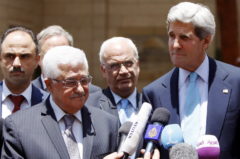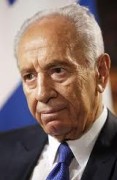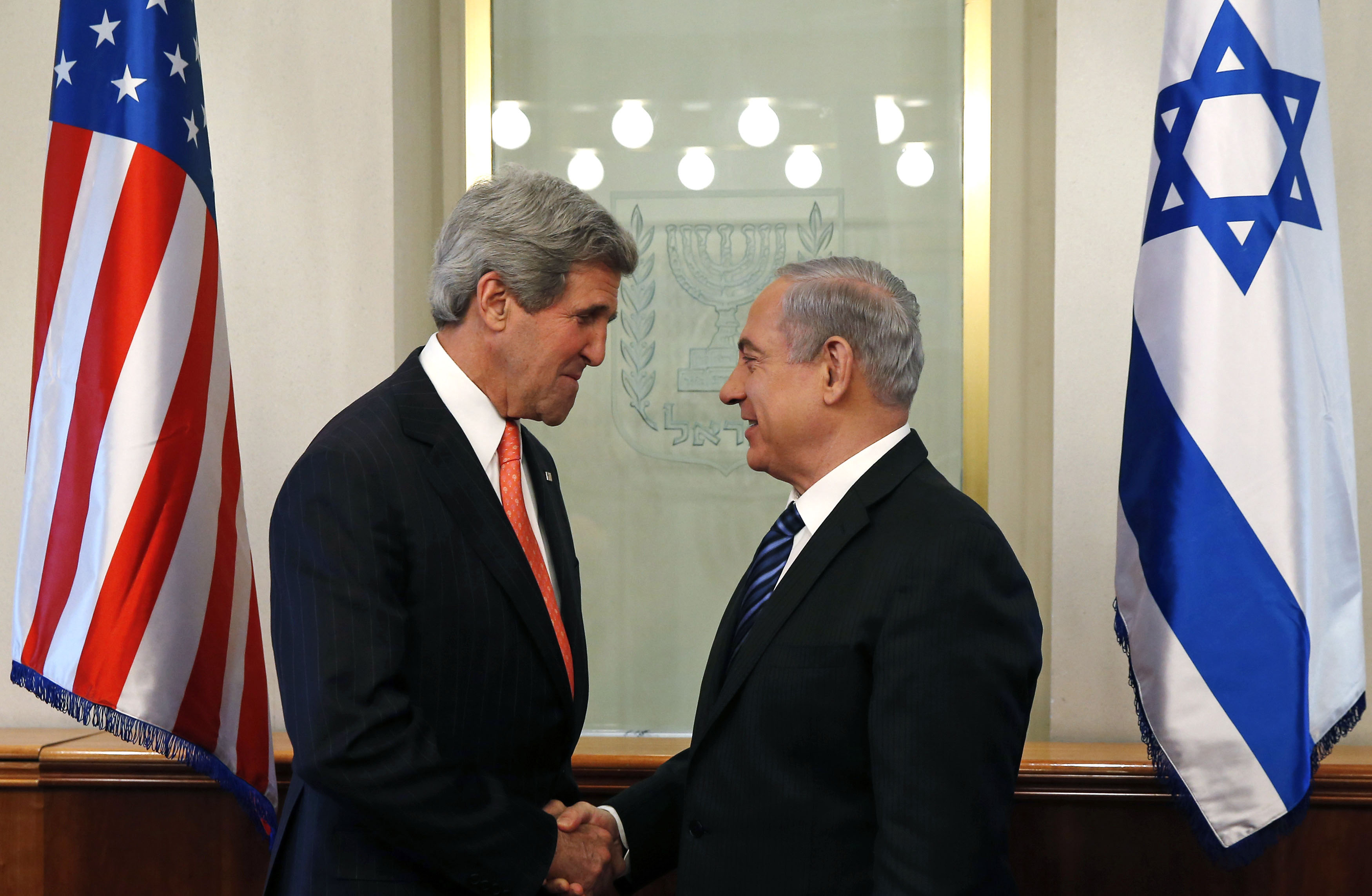Several months ago, as U.S. Secretary of State John Kerry shuttled one from one Middle East capital to another in an attempt to restart peace talks between Israel and the Palestinian Authority, he urged the Israeli government to seriously consider a revamped Arab League peace plan as a basis for resolving the Arab-Israeli conflict.
As he put it, “Israel needs to look hard at this initiative, which promises Israel peace with … Arab … and … Muslim nations. ”
Kerry made this comment after the Arab League, representing the countries of the Arab world, submitted its peace plan for the third time in 11 years. Saudi Arabia originally unveiled it at an Arab summit in Beirut in 2002 and then resubmitted it for consideration at a summit in Riyadh in 2007.

This past spring, at the urging of the United States, the Arab League resuscitated it at a ceremony in Washington, D.C. during which the foreign minister of Qatar, Sheikh Hamad bin Jassem al-Thani, declared that a peaceful resolution of the Arab-Israeli dispute was “a strategic choice for the Arab states.”
Backed by the 57-member Organization of Islamic Cooperation, a panoply of Arab nations such as Egypt, Syria and Jordan, and the Palestinian Authority, Saudi Arabia’s plan is clearly a political and psychological breakthough in the annals of Middle East peacemaking, one that Israel can downplay or ignore only at its peril.
“This peace proposal is the best possible settlement of the Arab-Israeli conflict,” American scholar Fawaz Gerges writes in his newest book, Obama and the Middle East. “It shows the depth of change in the view of the Arab regimes toward Israel, though the change is much slower at the grassroots level. The Arab states have, for the first time since Israel’s founding, reached a consensus on recognizing the Jewish state and establishing normal relations with it.”
Joshua Teitelbaum, a senior research fellow at the Moshe Dayan Center for Middle Eastern and African Studies at Tel Aviv University, concurs that the Arab League plan is generally a step in the right direction.
In a monograph published by the Jerusalem Center for Public Affairs, he describes it as a sharp departure from a reactionary Arab League resolution tabled in Khartoum in August 1967 in which delegates unanimously rejected peace and negotiations with Israel, let alone recognition of Israel.
And compared to the pan-Arab condemnation of Egypt’s peace treaty with Israel in 1979, the Arab League plan is revolutionary both in tone and substance.
In short, it merits serious consideration.
Israel, nonetheless, has greeted it with a combination of faint praise, virtual silence and utter disdain, notwithstanding Israel’s constant refrain that peaceful relations with its Arab neighbors is its greatest goal and desire.
The Arab League initiative, the brainchild of King Abdullah of Saudi Arabia, calls for a full Israeli withdrawal from territories captured by Israel during the Six Day War, the formation of a sovereign and independent Palestinian state in the West Bank and the Gaza Strip, with eastern Jerusalem as its capital, and a ” just and agreed upon” solution of the Palestinian refugee problem.
In exchange, member states of the Arab League would recognize Israel and normalize relations with it.

When the plan was initially introduced, the then Israeli foreign minister, Shimon Peres, now Israel’s president, called it interesting, positive, new and fascinating. The prime minister, Ariel Sharon, was more circumspect, saying he would be willing to personally discuss it with Saudi leaders, who rejected his suggestion.
Unfortunately, the Arab League plan was unrolled at the worst possible moment, just a day after a Hamas suicide bomber detonated a powerful bomb in a Netanya hotel, killing 29 Israelis, in the worst such attack during the second Palestinian uprising. The bombing, which took place during a festive Passover meal, prompted Israel to launch Operation Defensive Shield, during which the Israeli army reoccupied Palestinian towns in the West Bank.
The plan, too, touches a raw Israeli nerve. Although some Israeli leaders have acknowledged its historic importance, they have been critical of its reference to the Palestinian refugee issue. The clause pertaining to refugees reads: “Achievement of a just solution to the Palestinian refugee problem to be agreed upon in accordance with United Nations General Assembly Resolution 194.”
Resolution 194 was passed on Dec. 11, 1948, toward the end of the first Arab-Israeli war. It called for the return of Palestinian refugees to their homes in what was formerly Palestine but which became Israel following Israel’s Declaration of Independence in May 1948.
Understandably, Israel is concerned that the return of refugees would be a demographic ticking time bomb, compromising its integrity and viability as a Jewish state due to the much higher Arab birthrate. According to Teitelbaum, the Arab League plan enshrines a Palestinian “right of return” to Israel. But the key words “agreed upon” in the Arab League plan mean that this clause is open to negotiation and modification so that Israel’s core interests are not undermined.
Israel also objects to the Arab League’s take-it-or-leave-it approach, which sounds like a diktat. The Saudi foreign minister has said that the plan is “an indivisible whole and consequently it is impossible to accept one part of it and refuse another.” But here, too, there may be wiggle room, particularly if the United States brings pressure to bear on Saudi Arabia.

This precedent has already been set. Last April, bending to Kerry’s request, the Arab League tweaked its plan, easing its demand for a complete Israeli withdrawal from the occupied territories and endorsing the concept of comparable and mutually agreed minor land swaps between Israel and the Palestinian Authority.
Kerry hoped that this significant shift by the Arab League would hasten the resumption of Israeli-Palestinian talks, which were broken off in 2008. The revised Arab League plan was indeed instrumental in relaunching the latest round of peace talks, which began on July 31 and whose objective is a comprehensive peace agreement.
The latest incarnation of the plan, to which Hamas is opposed, was hailed by Israel’s former prime minister, Ehud Olmert, as “a historical opportunity.”
Tzipi Livni, Israel’s chief negotiator at the talks, welcomed it as well. “It is important for the Palestinians to know that they have the support of the Arab world for a negotiated peace agreement that ends the conflict,” she said. “It’s imperative for the Israeli public to know that peace with the Palestinians means peace with the entire Arab world.”
However, Israeli Prime Minister Benjamin Netanyahu, who has grudgingly come out in favor of a two-state solution, has maintained a deafening silence. The closest he has come to acknowledging its existence was a comment he made in which he said he will be “attentive to any (Arab) initiative” and would be ready to “discuss any initiative that is a proposal and not a dictate.”
Ominously enough, Israeli Defence Minister Moshe Yaalom has already has dismissed the plan, having described it as “spin” and a diktat that would force Israel “to make great concessions before being able to present its own demands.”
In the face of this recalcitrance, Danny Yatom, a former director of the Mossad spy agency, has warned that Netanyahu’s silence is a “mistake.” In his judgment, Israel’s embrace of the plan would help “strengthen and cement mutual trust” between Israel and the Arabs.
Israel should take Yatom’s sober assessment into consideration by accepting, in principle at least, the Arab League plan. It’s the single most important and balanced Arab peace plan in the history of the Arab-Israeli conflict.
It’s an opportunity Israel should grasp sooner rather than later.
